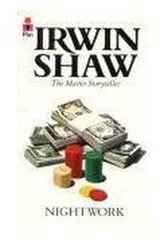Irwin Shaw - Short Stories - Five Decades
Здесь есть возможность читать онлайн «Irwin Shaw - Short Stories - Five Decades» весь текст электронной книги совершенно бесплатно (целиком полную версию без сокращений). В некоторых случаях можно слушать аудио, скачать через торрент в формате fb2 и присутствует краткое содержание. Год выпуска: 2013, Издательство: Open Road Media, Жанр: Современная проза, на английском языке. Описание произведения, (предисловие) а так же отзывы посетителей доступны на портале библиотеки ЛибКат.
- Название:Short Stories: Five Decades
- Автор:
- Издательство:Open Road Media
- Жанр:
- Год:2013
- ISBN:нет данных
- Рейтинг книги:5 / 5. Голосов: 1
-
Избранное:Добавить в избранное
- Отзывы:
-
Ваша оценка:
- 100
- 1
- 2
- 3
- 4
- 5
Short Stories: Five Decades: краткое содержание, описание и аннотация
Предлагаем к чтению аннотацию, описание, краткое содержание или предисловие (зависит от того, что написал сам автор книги «Short Stories: Five Decades»). Если вы не нашли необходимую информацию о книге — напишите в комментариях, мы постараемся отыскать её.
Short Stories: Five Decades — читать онлайн бесплатно полную книгу (весь текст) целиком
Ниже представлен текст книги, разбитый по страницам. Система сохранения места последней прочитанной страницы, позволяет с удобством читать онлайн бесплатно книгу «Short Stories: Five Decades», без необходимости каждый раз заново искать на чём Вы остановились. Поставьте закладку, и сможете в любой момент перейти на страницу, на которой закончили чтение.
Интервал:
Закладка:
“Mr. Mayer,” Mrs. Shapiro said with passion, her fists quivering on her little thighs, “is a crook! He took my money and he put it out in second mortgages. Eight thousand dollars’ worth of second mortgages!”
She stopped. For the moment she could not say another word.
“Today,” my father said, “even first mortgages are no good. Nothing’s any good any more.”
“In the last two years,” Mrs. Shapiro said, her eyes filling with tears, “I haven’t got a penny out of them … out of eight thousand dollars’ worth of second mortgages, not a penny …” A little rag of a handkerchief came out and wiped at her eyes. “I used to go to Mr. Mayer and he’d tell me I’d have to wait. How long can I wait? I don’t have with what to eat now, as it is! Can I wait longer than that?” Triumphantly she wept. “Now Mr. Mayer won’t see me any more. They tell me he’s out when I go there. It doesn’t do any good to go there.” She stopped, wiping her eyes. We sat, uncomfortable and still.
“I’m going to the houses where I have the second mortgages,” Mrs. Shapiro said. “Nice houses, they are … like this. With rugs and curtains and steam heat and something cooking on the stove that you can smell inside. I have the second mortgage on houses like that, and I don’t have enough to eat …” Her tears soaked through the rag of a handkerchief. “Please,” she cried, “please … give me something. I don’t want the eight hundred dollars, but something. It’s my money … I have nobody. I have rheumatism and there’s no heat in my room and there’re holes in my shoes. I walk on my bare feet … Please … please …”
We tried to stop her but she kept on, crying, “Please … please … just a little bit. A hundred dollars. Fifty. My money …”
“All right, Mrs. Shapiro,” my father said. “Come back next Sunday. I’ll have it for you then …”
The tears stopped. “Oh, God bless you,” Mrs. Shapiro said. Before we knew what she was about she flung herself across the room and was on her hands and knees in front of my father and was kissing his hand wildly. “God bless you, God bless you,” she cried over and over again. My father sat through it nervously, trying to pick her up with his free hand, looking pleadingly at my mother.
Finally my mother could bear it no longer. “Mrs. Shapiro,” she said, breaking in over the “God bless you”s, “listen to me! Stop that! Please stop it! We can’t give you anything! Next Sunday or any Sunday! We haven’t got a cent.”
Mrs. Shapiro dropped my father’s hand. She stayed on her knees in front of him, though, looking strange there in the middle of our living room. “But Mr. Ross said …”
“Mr. Ross is talking nonsense!” my mother said. “We have no money and we’re not going to have any! We expect to be thrown out of this house any day now! We can’t give you a penny, Mrs. Shapiro.”
“But next Sunday …” Mrs. Shapiro tried to make my mother understand that she didn’t expect it now, not for another week …
“We won’t have any more next Sunday than we have today. And we have eighty-five cents in the house right now, Mrs. Shapiro!” My mother stood up, went over to Mrs. Shapiro, where she was kneeling on the floor. Before my mother could touch her, Mrs. Shapiro keeled over onto the floor, hitting it heavily, like a packed handbag that’s been dropped.
It took us ten minutes to pull her out of her faint. My mother gave her tea, which she drank silently. She didn’t seem to recognize us as she drank her tea and made ready to go off. She told us that this was the fifth time in two months that she had fainted like that. She seemed ashamed of herself, somehow. My mother gave her the address of a doctor who would wait for his money and Mrs. Shapiro went out, her fat, shabby stockings shaking as she went down the steps. My mother and I watched her as she shambled down the street and disappeared around the corner, but my father went into the kitchen and the New York Times .
She was back the next Sunday and two Sundays after that, ringing the bell, but we didn’t open the door. She rang for almost a half-hour each time, but we all sat quietly in the kitchen, waiting for her to go away.

Sailor off the Bremen
T hey sat in the small white kitchen, Ernest and Charley and Preminger and Dr. Stryker, all bunched around the porcelain-topped table, so that the kitchen seemed to be overflowing with men. Sally stood at the stove turning griddle-cakes over thoughtfully, listening intently to what Preminger was saying.
“So,” Preminger said, carefully working his knife and fork, “everything was excellent. The comrades arrived, dressed like ladies and gentlemen at the opera, in evening gowns and what do you call them?”
“Tuxedoes,” Charley said. “Black ties.”
“Tuxedoes,” Preminger nodded, speaking with his precise educated German accent. “Very handsome people, mixing with all the other handsome people who came to say good-bye to their friends on the boat; everybody very gay, everybody with a little whisky on the breath; nobody would suspect they were Party members, they were so clean and upper class.” He laughed lightly at his own joke. He looked like a young boy from a nice Middle Western college, with crew-cut hair and a straight nose and blue eyes and an easy laugh. His laugh was a little high and short, and he talked fast, as though he wanted to get a great many words out to beat a certain deadline, but otherwise, being a Communist in Germany and a deck officer on the Bremen hadn’t made any obvious changes in him. “It is a wonderful thing,” he said, “how many pretty girls there are in the Party in the United States. Wonderful!”
They all laughed, even Ernest, who put his hand up to cover the empty spaces in the front row of his teeth every time he smiled. His hand covered his mouth and the fingers cupped around the neat black patch over his eye, and he smiled secretly and swiftly behind that concealment, getting his merriment over with swiftly, so he could take his hand down and compose his face into its usual unmoved, distant expression, cultivated from the time he got out of the hospital. Sally watched him from the stove, knowing each step: the grudging smile, the hand, the consciousness and memory of deformity, the wrench to composure, the lie of peace when he took his hand down.
She shook her head, dumped three brown cakes onto a plate.
“Here,” she said, putting them before Preminger. “Better than Childs restaurant.”
“Wonderful,” Preminger said, dousing them with syrup. “Each time I come to America I feast on these. There is nothing like it in the whole continent of Europe.”
“All right,” Charley said, leaning out across the kitchen table, practically covering it, because he was so big, “finish the story.”
“So I gave the signal,” Preminger said, waving his fork. “When everything was nice and ready, everybody having a good time, stewards running this way, that way, with champagne, a nice little signal and we had a very nice little demonstration. Nice signs, good loud yelling, the Nazi flag cut down, one, two, three, from the pole. The girls standing together singing like angels, everybody running there from all parts of the ship, everybody getting the idea very, very clear—a very nice little demonstration.” He smeared butter methodically on the top cake. “So then, the rough business. Expected. Naturally. After all, we all know it is no cocktail party for Lady Astor.” He pursed his lips and squinted at his plate, looking like a small boy making believe he’s the head of a family. “A little pushing, expected, maybe a little crack over the head here and there, expected. Justice comes with a headache these days, we all know that. But my people, the Germans. You must always expect the worst from them. They organize like lightning. Method. How to treat a riot on a ship. Every steward, every oiler, every sailor, was there in a minute and a half. Two men would hold a comrade, the other would beat him. Nothing left to accident.”
Читать дальшеИнтервал:
Закладка:
Похожие книги на «Short Stories: Five Decades»
Представляем Вашему вниманию похожие книги на «Short Stories: Five Decades» списком для выбора. Мы отобрали схожую по названию и смыслу литературу в надежде предоставить читателям больше вариантов отыскать новые, интересные, ещё непрочитанные произведения.
Обсуждение, отзывы о книге «Short Stories: Five Decades» и просто собственные мнения читателей. Оставьте ваши комментарии, напишите, что Вы думаете о произведении, его смысле или главных героях. Укажите что конкретно понравилось, а что нет, и почему Вы так считаете.











